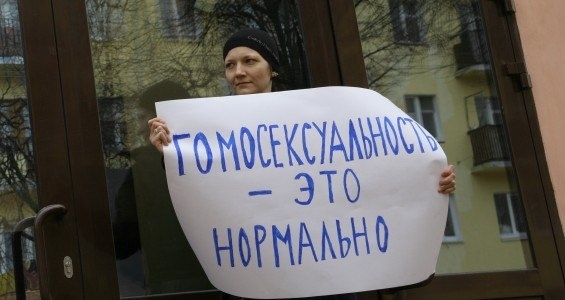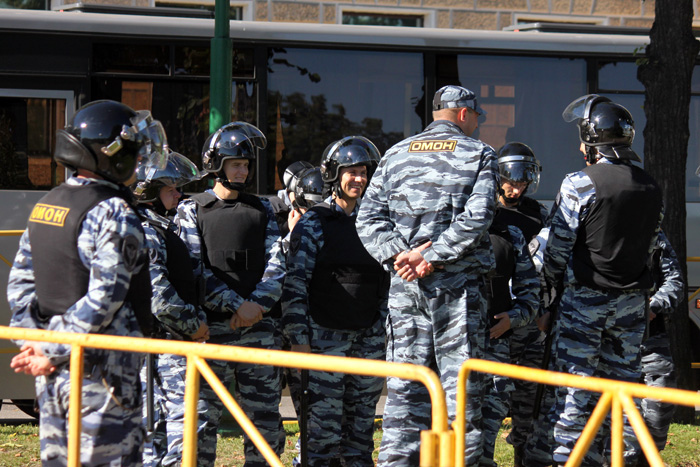Most articles about the rights of Lesbian, Gay, Bisexual, and Transgender (LGBT) individuals in Russia describe the current situation as a "crackdown," a "backslide," an "onslaught," a "war." If there's an accompanying image, there's a good chance it's that of a bloodied face, a rainbow-clad Vladimir Putin, or a neo-Nazi marching.
Yes, there're plenty of problems with Vladimir Putin's assurances that discrimination is unthinkable in Russia simply because it is forbidden by the country's constitution. They've outlawed corruption, too, yet the Russian Federation is ranked 133 out of 174 in Transparency International's Corruption Perceptions Index for 2012. The concept of discrimination is under-developed in Russia's legal code, and its civil society groups working on tolerance and nondiscrimination issues have long been calling on the government to adopt comprehensive anti-discrimination laws. Violence motivated by sexual orientation and gender identity bias is also reportedly on the rise amidst the government-led effort to suppress the fundamental rights of LGBT Russians.
The attack on Moscow's popular "Central Station" gay club on November 23 and the bomb threat delaying opening of the Side by Side film festival in Saint Petersburg are but few recent examples of the type of violence that must be investigated and prosecuted by the Russian government.
Yet little is said about the LGBT rights groups' ability to survive in Russia, about how they continue to operate and maintain direct services or educational & advocacy initiatives on behalf of their embattled communities in modern Russia, where consensual same-sex relations are still allowed since decriminalization in 1993. What Vladimir Putin is right about is that anyone in Russia can indeed rise to power and prominence no matter whom that person loves (caveat: the love has to stay secret if it's not "traditional" enough for the Kremlin).
Let's call this gray area the Wiggle Room in which Russian LGBT rights advocates are able to work today. It is a key indicator that will make or break LGBT rights in Russia.
Perhaps in response to the unprecedented international outcry over the federal ban on "propaganda" of nontraditional sexual relations to minors that was enacted by President Putin following a unanimous State Duma vote in June 2013, the Wiggle Room has been growing as the boundaries of what LGBT rights advocates can do publicly have been expanding. There are several factors that could be considered to better evaluate the Wiggle Room's expanding limits, including these five:
1. LGBT groups "Coming Out" and "Side by Side" are "foreign agents" no more!

2. The first repeal! Arkhangelsk trashes its regional ban on "propaganda" of homosexuality to minors.

3. Russia makes a promise at the UN to investigate and prosecute homophobic incidents.

4. An activist's fine for "propaganda" overturned by a regional court in Ryazan.

5. LGBT rights demonstrations officially allowed and well protected during the G20 Summit in Russia.

I was in Saint Petersburg during the G20 to meet with activists and observe the demonstration, and in my estimation the activists were outnumbered by the protesters four to one. Still, the area was well-protected by the police who were on their best behavior and resembled a professional, organized Western European police force. The cops were thanked by activists before boarding a police-driven bus that carried them to safety. Again, the message is clear: Russia can do the right thing when it wants to. See for yourself:
These examples illustrate that although international attention was important, the real work for Russian LGBT rights activists is in courts and on the streets. They will succeed only if the government stops ignoring their problems and becomes more cooperative, giving LGBT rights organizations and other civil society groups more breathing room. The non-ideological nature of Russia's "war on gays" means that if the Kremlin realizes that populist homophobia isn't useful anymore, things can go back to "normal." To help ease this transition, the world should continue speaking out and engaging with Russia at the highest level.
Now is the time to go to Russia--for the Olympics, for the culture and food, and, most importantly, for the people.


